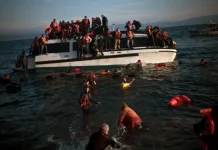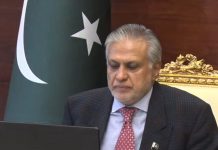From Tehmina Mustapha
TEHRAN: Iran on Sunday condemned a “cowardly” night-time drone at-tack that targeted a defence ministry site, at a time of high tensions over its nuclear programme and Russia’s war in Ukraine.
An anti-aircraft system destroyed one drone and two others exploded, the ministry said, adding that there were no casualties and only minor damage to the site in the central province of Isfahan.
“This cowardly act was carried out today as part of the efforts made by en-emies of the Iranian nation in recent months to make the Islamic republic insecure,” Foreign Minister Hossein Amir-Abdollahian said at a press con-ference with his visiting Qatari counterpart, Mohammed bin Abdulrahman Al-Thani.
“Such measures cannot affect the will and intention of our specialists for peaceful nuclear developments,” he added.
A fireball lit up the night sky in video footage widely shared on social media and published by Iranian state media, with people outside seen running and emergency service vehicles speeding towards the site.
The defence ministry described the attack as “unsuccessful”, saying it was carried out “on one of the workshop complexes of the ministry”, State me-dia reported.
“The attack, which occurred at around 11:30pm (2000 GMT) on Saturday, did not cause any disruption to the operation of the complex,” it said.
Authorities did not elaborate on activities at the site, but State media said the strike had targeted “an ammunition manufacturing plant”.
It added that “one of the quadcopters used in the attack, which suffered less damage during the confrontation operation, was handed over to the security forces stationed in the complex”.
Parliament member Mohammad-Hassan Assafari told media that “oppo-nents and enemies” of Iran aimed to “disrupt the defensive power” of the country with the attack.
The drone strike comes at a tense time in Iran, which has been rocked by protests over the death in custody of Kurdish-Iranian woman Mahsa Amini in September, and as the standoff with major powers over its nucle-ar programme remains unresolved. Iran has also faced Western accusa-tions that it has been supplying armed drones to Russia for use in the war in Ukraine, a charge Tehran denies.
Iran has been engaged in a shadow war for years with its arch-enemy Isra-el, blamed for a series of sabotage attacks and assassinations targeting the Iranian nuclear programme, and with Israel’s ally the United States. A few hours before the Isfahan attack, a major fire broke out at a motor oil pro-duction plant in the northwestern province of East Azerbaijan.
It published images of the blaze in the key industrial complex of Shahid Salimi linked to the industry ministry, and said authorities were investigat-ing.
Shahid Salimi in the city of Azarshahr is the largest industrial zone in northwestern Iran, hosting 790 factories and other facilities employing nearly 28,000 workers, according to state media.
Iran has several known nuclear research sites in the Isfahan region, includ-ing a uranium conversion plant. In April 2021, Tehran announced it had started producing 60 per cent enriched uranium at the Natanz site in Isfa-han province.
Negotiations to revive the 2015 nuclear deal, known formally as the Joint Comprehensive Plan of Action, between Iran and world powers have stalled for months for multiple reasons, including the protests in the coun-try.
The agreement offered Iran sanctions relief in exchange for curbs on its nuclear programme to guarantee that Tehran could not acquire or build a nuclear weapon — an objective it has always denied pursuing.
But in 2018 then-US president Donald Trump declared a unilateral with-drawal from the accord and reimposed a painful sanctions regime, prompt-ing Iran to begin rolling back on its own commitments.
On Sunday, Amir-Abdollahian said Qatar’s foreign minister had passed on “messages from the other parties to the nuclear agreement”, without providing details.
“We welcome any initiative put forward by our friends in Qatar to solve the issue of talks,” he said. Iran’s nuclear programme has been the target of sabotage, assassinations of scientists and cyber-attacks.
Iran has accused Israel of carrying out several covert actions on its soil, in-cluding an attack allegedly using a satellite-controlled machine gun which killed leading nuclear physicist Mohsen Fakhrizadeh in November 2020.




